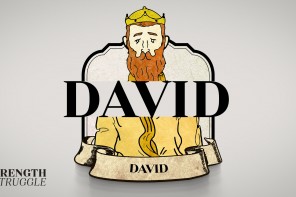The book of II Samuel is about David as king. Samuel the prophet has already passed away, and the king whom he anointed and whom he regretted crowning, Saul, has been killed in battle with the Philistines. This book begins with a young man fleeing to David from the battle at Mt. Gilboa with the news of the death of Saul and his son, David’s most beloved friend, Jonathan.
Given that Saul had been in deadly pursuit of David for some time, one might have thought that David would welcome the news and accept it readily, rejoicing that the threat to his life had been lifted and that Samuel’s promise of his ascent to the throne was now to be fulfilled. But the text tells a different story. David passionately mourned the king and his son, the text recording the words of the lament he then composed.
This continues the theme already seen in I Samuel—while Saul, mentally wounded, had sought to kill David, David had sought reconciliation. David fled from Saul, but he had never become his enemy in his own heart and mind. Now, in grief, he expressed his love for the king and his son Jonathan in words that convey deep emotion.
Though Saul was gone, kingship did not follow David immediately. Communing with G-d, David followed His instructions and returned from the land of the Philistines to Hebron, in the heartland of his own tribe, Judah. There, the people of Judah acclaimed him as the king of their tribe. But at the same time, Saul’s general Abner took Saul’s surviving son Ish Boshet and set him up as king over the rest of Israel. The war against David that Saul had begun now continued, with sporadic fighting. The text notes, though, that there was a clear trend to the war—David’s forces, under the leadership of his general, Joab, kept growing stronger, while those of Abner and Ish Boshet kept growing weaker.
The end for Ish Boshet did not come on the battlefield, but from a falling-out with his general over a woman. Abner had taken up with one of Saul’s concubines. Standing on royal privilege, Ish Boshet upbraided Abner severely. Perhaps due to the tensions brought about by the decline of their cause, this triggered a snap. With strong words, Abner denounced Ish Boshet and told him he was now going to help transfer the kingship from Saul’s house to David.
Abner meets with David and meets his terms, but David’s general, Joab, was displeased, for during the war, Abner had killed Joab’s brother after having warned him not to pursue him in battle. Joab was less gallant in seeking vengeance. Away from David, Joab pretended to beckon Abner to a peaceful conversation. When Abner approached, unsuspecting, Joab gutted him with his blade.
David again mourned the death of someone who had once been his enemy, leading the funeral procession and convincing the men of the army that he was innocent of Joab’s deed, even though, acknowledging his own lack of power, he did not yet punish him.
Ish Boshet was killed in his bed by former followers, whom David also executes for the murder. Now, with no other claimant to the throne, all the tribes of Israel gather in Hebron and acclaim David, at age thirty, as king over the whole people.
The chapters of the book are filled with action as this energetic man takes firm hold of the reins of the kingdom. His first recorded act after his coronation is the conquest of Jerusalem, which had been ruled by the Jebusites, one of the Canaanite tribes. He established it as his capital, enlisting the help of King Hiram of Tyre to build his palace.
David now turned to the enemy that had vanquished Saul, and defeated the Philistines soundly. Afterwards, he began the process of bringing the Ark of the Covenant to Jerusalem. He brought the Ark into the Holy City with great rejoicing.
David sought to build a permanent sanctuary for the Ark, and received a go-ahead from the new prophet, Nathan. But the very night after he told David to go ahead, Nathan is given a new divine message: David is blessed, his dynasty will be established forever, but he is not to build the Temple—that is reserved for his son.
Sometime later, as David’s armies were busy fighting, David, at home, saw a beautiful woman and was attracted to her. She was Bathsheba, wife of one of his captains, Uriah. David followed his attraction, and as a result, she became pregnant. When Uriah refused David’s command to return and be together with his wife, David sent a sealed order that, on Uriah’s return to the fight, he was to be sent into an exposed position in the battle and then deserted there to be killed by the enemy.
The matter became known to Nathan the prophet, who told David a parable by which he brilliantly got the king to render judgment on his own act. David acknowledged his guilt, and was deeply contrite, and mourned over the prophesied death of the infant he and Bathsheba had conceived. But once the newborn’s death had occurred, he returned to passionate life and fathered the son who would inherit his kingdom, Solomon.
David was successful in war, but he continued to suffer from his family life, as also prophesied by Nathan following the Bathsheba debacle. Amnon, one of his sons, became fixated on his half-sister Tamar. He eventually lured her close to him, raped her and then pushed her away from him with disgust. Tamar was devastated and her full brother, Absalom, saw, took it to heart and began to plan for revenge.
It took two years, but eventually, he arranged for Amnon to be alone with him. He plied him with wine, then gave a signal to his men, who came in and killed the tipsy Amnon. Absalom then fled the kingdom, and David was left to mourn two sons. Joab was finally able to intervene effectively in the family affair and succeeded in bringing about a tearful rapprochement.
All, however, was not well. Absalom began to insert himself into the affairs of the people more and more, aiming to take affection and authority away from his father. He eventually organized a full-fledged coup and David was lucky to escape from Jerusalem with his life. Absalom occupied the capital and with his advisers, planned a campaign to finish David off. But one member of Absalom’s council, secretly in league with David, dissuaded Absalom from an attack that almost certainly would have succeeded. David was able to escape this peril, recruit forces of his own, and eventually successfully battle Absalom’s men.
As with Saul and Abner, David had no hate. In earshot of his troops, he instructed Joab to deal gently with Absalom. But Joab did not heed the king’s desire, and in the aftermath of his victory, when he found Absalom caught in a tree by the locks of his long hair, he sank three darts into his chest, then left him for his underlings to finish off. When David heard of Absalom’s death, he was incoherent with grief and stayed in grief until reprimanded by Joab for shaming the soldiers who had risked their lives to save him from his rebellious son.
The people of Israel now decided to call David back as their king, and he returned to Jerusalem. He dealt successfully with a revolt and with more war with the Philistines. His only failing stemmed from his own careless idea of calling a census of his own accord. The prophet Gad rebuked the king in G-d’s name, and the kingdom was stricken with a great plague. David interceded with G-d, pleading that the people should not suffer for an act for which he was solely responsible. G-d stopped the plague before it reached Jerusalem, at the threshing floor of Arauna.
The prophet Gad then came to David with a message: G-d has chosen Arauna’s threshing floor to be the site of the future Temple. David purchased the site from the willing Arauna, and with all prepared for the construction of G-d’s desired sanctuary, this book comes to its end.





